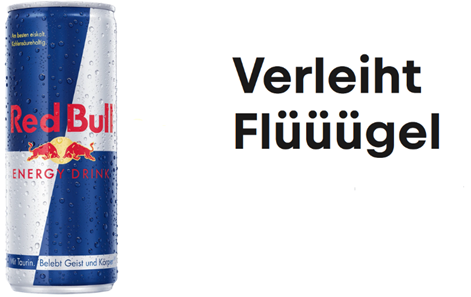Free-Riding on Taglines – Red Bull … Gives you wings
The case: One of Red Bull’s most recognisable marketing ploys is the tagline for its energy drinks:

The tagline is registered as an Austrian trade mark and was used so intensively that it quickly became well known. In addition, a slightly different spelling of ‘wings’ was used, with a repeated ‘i’ (English) or ‘ü’ (German):

With taglines of this kind, one can rely on trade mark protection with a certain peace of mind. ‘… GIVES YOU WINGS’ constitutes a distinctive metaphor. In a figurative sense, it conveys the message that the energy drinks in question are intended to inspire and motivate the consumer to ‘fly’, reach great heights or achieve success. The word ‘wings’ is the main draw, pointing as it does to the feeling of lightness, energy, happiness or even contentment conveyed by the drinks.
The tagline does not exclusively, or in a direct and readily comprehensible manner, describe the properties of the energy drinks. If it did, this could be an obstacle to protection of the advertising slogan. Where a tagline is successful in terms of protection, the content of the advertising slogan only becomes apparent on the basis of a play of ideas. Thus, in addition to its laudatory and advertising quality, it also conveys the operational indication of origin required for a trade mark.
However, in Red Bull’s case, a Cypriot company, Asolo Ltd, had a registration of a Union trade mark amongst others for its alcoholic beverages:

Red Bull, of course, did not like this. They demanded the trade mark ‘Flügel’ be cancelled for infringement of Red Bull’s tagline, registered as a trade mark.
In Red Bull’s favour, protection of reputation did become relevant. The prerequisite for the protection of reputation is that a serious risk exists that the use of a similar sign will take unfair advantage of or be detrimental to the distinctive character or repute of the mark with a reputation without due cause. It does not matter whether the opposing goods are similar or not.
In the present case, it was the similarity of the marks that was in question, with the word element ‘wings’ being the only part that the marks had in common. The marks were otherwise distinguished by the word ‘gives’, as well as by the ellipsis in front of it. However, the word ‘wings’ dominated Red Bull’s slogan, and the similarity inherent in this dominant element was enough to consider the younger mark similar in every respect.
This similarity would have been assumed, even had the word ‘wings’ not dominated Red Bull’s tagline. Indeed, even if the marks were each juxtaposed in their entirety, the signs would be deemed visually and orally similar. And from a conceptual point of view they would also correspond. This is because the younger sign also conveys the idea that the alcoholic beverages it protects give the consumer ‘wings’.
This similarity was sufficient to be able to fulfil the further requirements that must be present for the protection of reputation. A significant proportion of consumers would assume that they could consume Asolo’s drinks in the confidence that they were associated with Red Bull’s earlier mark. The power of attraction and the advertising effect of the well-known earlier mark could thus be abusively exploited. Consequently, the trade mark ‘Flügel’ was cancelled.
Court of Justice of the European Union of 28 April 2021, T-509/19.
Learnings: By definition, taglines convey an objective, albeit simple, message to a greater or lesser extent. Nevertheless, they may be an effective way of drawing the consumer’s attention to the commercial origin of the goods or services in question. This may be the case, in particular, if such marks do not merely constitute an ordinary advertising message but have a certain originality or resonance which requires at least some interpretation by the relevant public or triggers a cognitive process in the latter. If a slogan registered as a trade mark conveys such an indication of origin of a business, it can also be infringed by a designation that corresponds only to a single element of the slogan.
Therefore, if you’re wary a competitor might exploit your slogan, you should first check your slogan very carefully, in light of the present case, to see whether and in what way it conveys an indication of business origin and is therefore protectable.
Reference: See also this article on taglines:
Advertising with environmental reference – CLIMATE-NEUTRAL